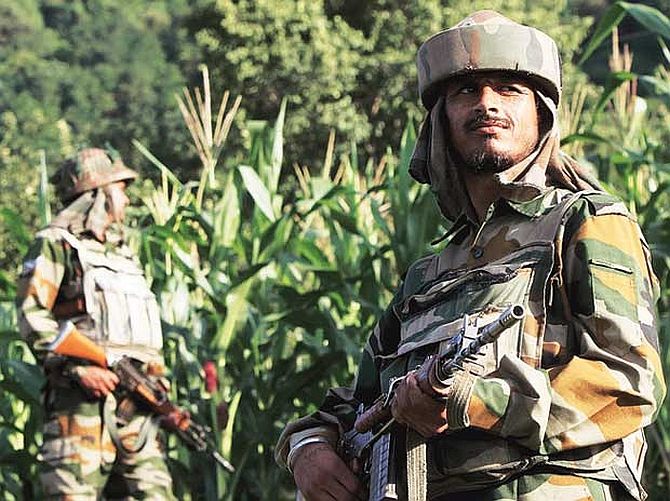The bravado of NDA ministers may have undone the gains made in cross-border security cooperation over the past several years. Ajai Shukla reports

In 1986, as the intelligence officer of a brigade in Nagaland, I oversaw the first Indian army patrol that went into Myanmar. With clearance from Yangon, we linked up with a forward post of the Myanmar military, or Tatmadaw, and proposed joint action against insurgents fighting for Nagaland's secession from India.
Myanmar's military government controlled just 20 per cent of the country's territory, the remainder being in the hands of Kachin, Keran, Wa and Shan separatists, and powerful Naga groups along the Indian border.
Even knowing that, our officers were surprised at how embattled the Tatmadaw unit was, and how relieved it was at the prospects of Indian collaboration against Naga undergrounds.
Cooperation between India and the Tatmadaw thus goes back decades. Over the years, the Indian Army has conducted several operations inside Myanmar with the Tatmadaw's tacit agreement, but has wisely refrained from embarrassing Yangon or Naypyidaw (the capital since 2005) with public statements.
In the wildly successful 1995 Operation Golden Bird, the two armies jointly killed and captured some 150 militants.
Such cooperation, and improving political relations, led the two countries to sign a "Memorandum of Understanding on Border Cooperation" in Naypyidaw on May 8, 2014. The ministry of external affairs announced that it "provides a framework for security cooperation and exchange of information between Indian and Myanmar security agencies.
A key provision is that of conduct of coordinated patrols on their respective sides of the international border..."
Stretching the agreement for "coordinated patrols", Indian troops struck two underground camps several kilometres inside Myanmar on June 9, retaliating against an ambush on June 4, in which a group of undergrounds from at least three militant organisations killed 18 infantry soldiers, and wounded 15 more, in Chandel, Manipur.
The militant ambush was led by the Nationalist Socialist Council of Nagaland (Khaplang faction), or the NSCN(K), which last year ended a 14-year ceasefire with the Indian government.
The group's veteran leader, Khaplang, had long been propped up by Indian intelligence to weaken what they considered the more capable and dangerous rival grouping -- the NSCN faction led by Isak Swu and Thuingaleng Muivah, or NSCN(I/M).
When, in 1988, the army apprehended Khaplang's operations chief, Jesop Konyak, New Delhi quickly interceded to free Konyak and hush up the incident.
New Delhi's steadfast support of Khaplang turned in 1997, when the NSCN(I/M) signed a ceasefire with New Delhi, making Swu and Muivah the favoured interlocutors for a final Naga settlement.
A beleaguered Khaplang too signed a ceasefire in 2001, but realised to his chagrin that the NSCN(I/M) -- drawing support from the larger and more influential Thangkhul, Chakhesang, Lotha and Mao tribes -- would corner the lion's share of the spoils.
Khaplang's NSCN(K), supported mainly by Konyaks and Myanmar-based Naga tribes, would be left holding the wooden spoon.
Matters came to a head last year when Khaplang refused to renew the annual ceasefire agreement.
Although the NSNC(I/M) ceasefire continued, it was clear Khaplang needed a big operational success to underline his relevance.
Two small ambushes in Arunachal Pradesh and Nagaland during the last three months suggested a big ambush was coming.
Big lapse
The intelligence and military failure of the June 4 ambush might have been partly mitigated by the flawless retaliatory operation carried out on June 9 by 21st Battalion, the Parachute Regiment (Special Forces) on the underground camps in Myanmar.
The number of militants actually killed is debatable, but there is no doubt that the operation signalled to underground groups that any further attacks will invite retaliation, even in erstwhile safe havens in Myanmar.
For that signal to be credible, however, the Tatmadaw would have to remain on our side.
The army's statement, issued once everyone in the raiding party was safely back in India, was carefully calibrated to keep faith with the Tatmadaw.
It deliberately avoided mentioning that it had crossed into Myanmar.
But while the army's message was directed at anti-India militants, India's political leadership was more interested in voters.
Ignoring the effect on Indian Army-Tatmadaw relations, the top echelons of government began leaking news of a cross-border strike to "trusted" journalists.
"Someone, somewhere, was feeding them", points out Vikram Sood, former Research & Analysis Wing chief, citing a photograph published of the commandos who allegedly conducted the raid.
Foregoing deniability, the government deputed a junior minister, Colonel (Retired) Rajyavardhan Singh Rathore, to bat for it on television.
Rathore, an Olympic silver medallist in trap shooting with little experience of soldiering, duly shot his trap.
"Our prime minister has taken a very bold step and given a go-ahead for hot pursuit into Myanmar..." he pronounced.
Rathore's jingoism, played up by a drum beating media, evoked a predictable backlash.
Zaw Htay, director of Myanmar's presidential office, flatly contradicted Rathore, declaring that while there was "coordination" between the two armies, Indian troops never crossed into Myanmar.
Meanwhile, Islamabad responded aggressively to Rathore's threat that the Myanmar raid was "a warning to other countries".
Pakistan's interior minister, Nisar Ali Khan, warned India that "Pakistan is not a country like Myanmar".
New Delhi's politicisation of the Myanmar raid successfully subverted the military's message to Naga and Manipuri militants.
Says a top serving general ruefully: "I can only say that we soldiers were dismayed at how the benefits of a flawless military operation were squandered by leaders scrabbling for credit."
Notwithstanding the political bumbling, this raid into Myanmar raises important issues.
The army now knows it can expect political clearance for cross-border strikes on militant camps in response to grave provocation -- so far only in Myanmar, but potentially also in Pakistan.
The government's willingness to use military force puts the onus on the military to develop a cross-border response capability against Pakistan.
This demands a more sophisticated, calibrated approach to escalation.
Our Special Forces currently cannot conduct surgical strikes across the heavily defended Indo-Pakistan line of control, but India can credibly strike Pakistani targets with fighter aircraft, rocket salvos and cruise missiles.
The United Progressive Alliance government disregarded these options after the 26/11 Mumbai attacks in 2008. So did the National Democratic Alliance government after the 2001 terror strike on Parliament -- NDA unwisely leapt up the escalation ladder to full-scale military mobilisation, stopped short of war only by Pakistan's nuclear deterrent.
Now that the Indian military is aware that it can cross borders in retaliation, it will have to think and plan beyond Myanmar.
Finally, even the most successful cross-border raid cannot wish away the worrying question of how an Indian infantry battalion allowed itself to be ambushed with such heavy losses.
There are real questions around the military's force planning, procurement and promotion policies, and its treatment of ex-servicemen. But few doubt that our infantry battalions are formidable fighting units that deliver on the battlefield.











 © 2025
© 2025